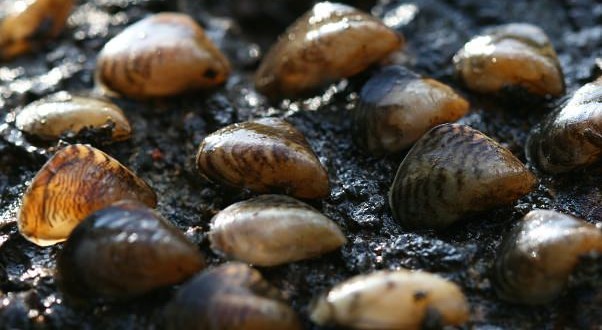A species of mussel which threatens to wipe out thousands of native animals and fish has been discovered in a reservoir near London Heathrow Airport.
Quagga mussels are less than 5cm long but breed so prolifically their vast colonies, which attach on to hard surfaces, can smother boat hulls, block pipes and potentially cause flooding.
Wildlife experts are extremely concerned about the quagga mussels, which have been described as “ecosystem engineers” because their vast capacity to filter water upsets the natural balance throughout the food web. They eat some pollutants, but they turn it into concentrated toxic poo which can poison drinking water for people and wildlife.
The Wildfowl & Wetland Trust’s London Wetland Centre is downstream from Wraysbury. WWT’s head of conservation policy, Jeff Knott said:
“This is a worrying, but entirely predictable, development that could be devastating to British wetlands. Quagga mussels are likely to indirectly cause suffering and death for hundreds of thousands of native animals, fish and plants and cost millions of pounds in tax and water bills to protect drinking water supplies.
“These tiny mussels can be devastating but look so innocuous, which is why it’s so difficult for boaters, anglers and other water users to avoid accidentally transferring them between water bodies when they latch onto their equipment. That’s why it’s so important for all water users to remember the motto “clean, check, dry” when they pack up their equipment to help slow the spread.
“Quagga mussels are a prime example of why we need stronger controls on invasive species being brought into this country. Prevention is far cheaper and more effective than trying to control an infestation that’s already established. There are plenty of other dangerous potential invasive species. Quagga mussels may have arrived, but we need to protect the UK against the next invasive species.”
Earlier this year the quagga mussel was unanimously identified by a group of scientists as the greatest single threat to Britain’s wildlife of any alien species. The horizon scanning exercise identified 30 species that are likely to be brought into Britain through human activity, which are also likely to establish themselves and harm native wildlife. The quagga mussel scored maximum threat in all three categories.
A mature quagga mussel can produce one million eggs a season. Once fertilised, the larvae can drift downstream for four weeks and up to 300 kilometres before forming new colonies. However, the spread to new areas is more often due to human activity. Adults attach to boats. The microscopic larvae are even more easily transported in cooling systems and ballast tanks.
Originally from the Ukraine, the species spread across Europe as new canals opened. It was introduced to the US by ships discharging ballast in the Great Lakes.
It has spread across the US and is flourishing in the warm waters of Lake Mead, formed by the Hoover Dam. Engineers are battling to stop the mussels colonising the dam’s turbines and blocking the pipes that supply water to Las Vegas.
The quagga mussel is similar in size and appearance the zebra mussel which is already established in Britain, including on the stretch of the Thames near WWT London Wetland Centre where it regularly blocks pipes. The zebra mussel has been implicated in several boating accidents and the cost of managing it on that stretch of water runs into the millions. The quagga mussel is expected to be more destructive and more expensive to manage.
Agencies/Canadajournal
 Canada Journal – News of the World Articles and videos to bring you the biggest Canadian news stories from across the country every day
Canada Journal – News of the World Articles and videos to bring you the biggest Canadian news stories from across the country every day



